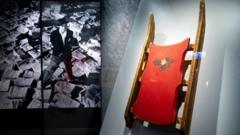Niger's government investigates the legality of the meteorite's auction after it fetched $4.3 million at Sotheby's, raising questions about heritage and trafficking.
**Mars Meteorite's Controversial Sale Sparks Outrage in Niger**

**Mars Meteorite's Controversial Sale Sparks Outrage in Niger**
A rare Martian meteorite sells for millions in New York, igniting a call for accountability from its home country.
In a shocking turn of events, a Martian meteorite weighing 24.7 kg, officially designated NWA 16788, was auctioned at Sotheby's in New York for $4.3 million. Found in Niger two years ago, this meteorite has spurred anger among experts and officials who believe it should have remained in its country of origin. Prof. Paul Sereno, a noted palaeontologist and advocate for Niger's cultural heritage, has labeled the sale "brazen," insisting that the sale disregards Niger’s legal and moral claim to the meteorite, a significant piece of its natural history.
The auction attracted attention due to its astronomical price, which highlights the growing trade in meteorites that resembles the fine art market. However, as Niger’s government expressed concerns regarding the legality of the meteorite's export, it has initiated an investigation into how this item left its soil. While Sotheby's asserts that all procedures were correctly followed, questions remain unanswered about the process that led to the meteorite's international sale.
Reports trace the meteorite's journey from a finder in the Sahara Desert to an international dealer, and later to Italy before its auction debut in the U.S. This incident has spotlighted safeguarding laws for meteorites, an area where Niger admitted it lacks specific legislation unlike many other nations dealing with similar issues. Previous studies indicate a grey zone exists in international agreements on meteorite trafficking, leaving countries like Niger vulnerable.
In contrast, nations like Morocco have dealt with this issue extensively, facing their own challenges with meteorite exports. Experts like Prof. Hasnaa Chennaoui Aoudjehane advocate for tighter regulations to preserve national heritage. The uncertainty surrounding meteorite sales raises ethical questions about cultural heritage as countries scramble to formulate legal frameworks protecting these treasures.
Prof. Sereno views this situation as a potential turning point that could galvanize Nigerien authorities to take more decisive action to protect their heritage. He envisions a future where such meteorites can find a home in museums in Niger, acknowledging the pressing need for global cooperation to address these complex cultural issues.















